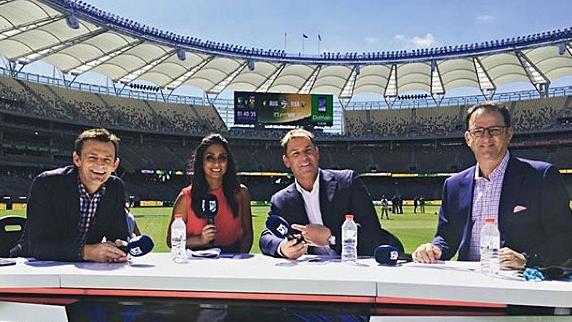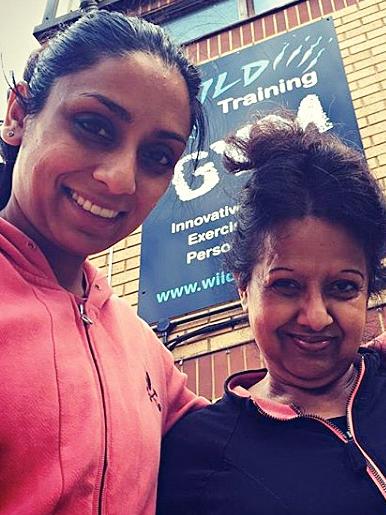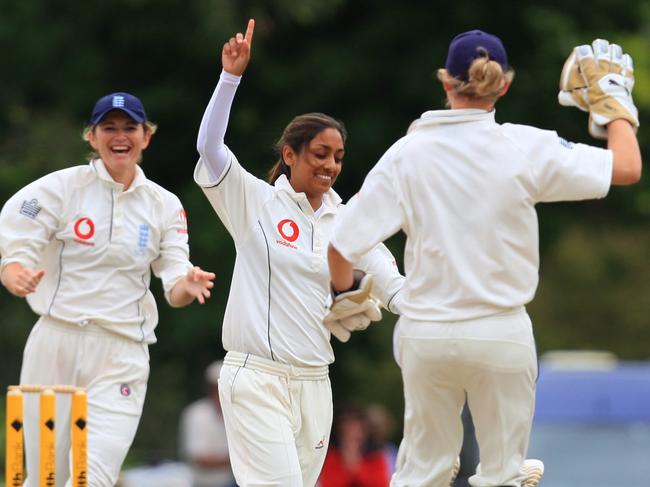Isa Guha: Meet the woman making history this summer
Retired British cricketer Isa Guha will be part of the new guard changing the face — and voice — of cricket in Australia this season. And as a woman working in what has conventionally been a man’s world, she knows all eyes will be on her.
Isa Guha’s cricket career began as so many cricketers’ do — in her backyard.
There were the requisite milk crates for stumps, the shed that acted as a boundary, and the slightly domineering big brother, who would declare Guha out after a few minutes of batting — and then blithely change the rules to make her bowl to him for hours.
But in Guha’s story there was also a mother who noticed her daughter’s skill, nurtured it, and persuaded her father to let her play with the boys at the local cricket club. And there was a father who, once convinced, was equally supportive of his daughter’s devotion to a sport that, back in the 1990s, was considered little more than a hobby for women.

During her years playing for England, Guha witnessed the transformation of women’s cricket. Now she is at the vanguard of another revolution, this time in the commentary box.
Over summer, she will join some of Australia’s best-known cricketers in the Fox Sports commentary team.
For everyone in that box, and for cricket lovers across the country, this is a big deal. For 40 years, cricket belonged to the Nine Network.
Its commentators’ voices were as much part of the soundtrack of an Australian summer as the chirping of cicadas.
But this year, cricket is changing hands. As part of the new guard — and a woman at that — Guha knows she’ll be under scrutiny.
“When you’re a female in a male environment, in commentary and broadcast, you do feel like you have to be right on the money. Because if you make the smallest mistake, then people are after you,” she tells Stellar.

“[But] I’ve never been intimidated working with a group of men, just because I’ve played cricket with a boys’ team from a young age. I actually quite enjoy that environment. I enjoy the banter, and enjoy being one of the lads at times. What I’ve come to realise is we’re all pretty much in the same space now. [The men] have been incredibly welcoming, and there is a mutual respect there.”
One day in late June 2002, Guha was a 17-year-old schoolgirl living in High Wycombe, Buckinghamshire, when she received a phone call that would change her life.
The chief selector for the women’s cricket team was on the line asking whether she would like to play for England.
For the cricket-mad teen, there was only one answer.
“I just remember being like a kid at Christmas,” the now 33-year-old recalls as she sits down to chat with Stellar.
“Coming from an Indian background, it was in the genes pretty much. It was such a great feeling to put on the whites, or the creams as we had back then, and receive my first cap from Clare Connor, my captain at the time.”
When the news became public, one newspaper reported, “England picks a girl who bowls it like Botham”.

She can still feel the thrill of those early days.
“I remember waking up every morning and going, ‘This is amazing.’ Like, ‘I love this moment.’ Back when you’re first starting out, everything’s a dream, you don’t have any pressure on your shoulders, you can just go out and do what you do and not have to worry about making mistakes; just enjoy it, lap it up and be fearless.”
Guha’s parents emigrated from Calcutta, India, but she is Buckinghamshire born and bred. Some liken her story to that of Jesminder Bhamra in the popular 2002 film Bend It Like Beckham — just replace the soccer with cricket — but Guha’s story differs significantly in that she never had to sneak around to play the sport she loved.
“You don’t always get that parental support and I really admire those kids that are able to still fight through and do what they want to do,” she says.
“But certainly, I did have the support.”
After her test debut against India in 2002, Guha would go on to become one of the best women’s cricket players in the world. Among her many achievements, she helped regain the Ashes on English soil in 2005, a feat that hadn’t been realised for 42 years.
She was ranked the International Cricket Council’s (ICC) number-one women’s bowler in 2008, and, in one of her fondest career highlights, helped England win the 2009 World Cup on Australian soil.

Guha retired in 2012, but didn’t wander far from the pitch; she has been commentating for the UK’s Sky TV. This summer she will sit alongside some of Australia’s most famous cricketers — Shane Warne, Adam Gilchrist and Ellyse Perry among them — as part of the commentary line-up for Fox Sports’s newly acquired cricket broadcast rights, which were wrestled off Nine by a joint venture between Fox Sports and the Seven Network.
The new line-up already has one fan — News Corp sports writer Jessica Halloran.
“For far too long women had been mostly ignored in the cricket TV commentary box in Australia,” Halloran tells Stellar.
“Not anymore.
“The inclusion of commentators like Isa and Mel Jones, and the continuing excellent work of journalists Neroli Meadows, Jess Yates and Sarah Jones on Fox Sports has done nothing but enrich the cricket coverage in this country.
“That two of our best cricketers, Ellyse Perry and Alyssa Healy, will also provide commentary on men’s cricket — in Healy’s case possibly on her husband’s matches [Healy is married to bowler Mitchell Starc] — is just awesome.
“I have no doubt their presence on our screens, their voices, will inspire another generation of women to commentate and play the game.”

Warne concurs.
“I’ve worked with Isa over the last few years with Sky in the UK. She’s a wonderful addition to the Fox cricket team. She has a terrific cricket brain, she knows her stuff and brings a sense of fun to the commentary box,” the cricketing great tells Stellar.
“At the end of the day, as a viewer, I like to listen to good commentary on any sports. It doesn’t matter what gender they are, as long as they enhance the pitches. And Isa does that very well.”
The commentators will not be the only ones under scrutiny. The Australian cricket team is still reeling from the ball-tampering incident that saw captain Steve Smith and vice-captain David Warner banned from playing for a year, and Cameron Bancroft for nine months.
A review found the Australian team had evolved into a machine that was “fine-tuned for the sole purpose of winning”.
Guha says it has been difficult to watch the fallout.
“Steve Smith seems like a decent guy and he’s been vilified for going out with his mates,” she says.
“These guys don’t have a chance to be able to go out and enjoy themselves without the public or the media coming down hard on them. It’s the same in India. It’s the same in England.”

Back in the days before social media, players could sort out their differences over a beer, she says. They can’t do that anymore.
“These days the guys just go back to their room, they play on their computer games, or whatever, and it’s just constant cricket. And they perhaps don’t have that release, and so that could get bottled up, and then it might come out on the field,” Guha says.
“However, they do need to be more careful about how they manage themselves and how they’re seen in the limelight, because, essentially, they are role models.”
Being a role model is something with which Guha, who is of Bengali descent, is familiar. She was the first British-Asian woman to represent England in any sport, and is one of the few women of colour in the media or commentary box.
“When I first played for England, there was that mention of ‘first British-Asian’, and I never really thought anything of it. I never put pressure on myself in that way at all. But now that I’ve retired … it’s all about visibility,” she observes.
“So if a young girl sees a fellow British-Asian playing cricket, then they automatically think, ‘Oh, well I can do that,’ and it’s something they can aspire to be. I do recognise that now, and I try and give support wherever I can, not just for British-Asians, but just for females in general.”
MORE STELLAR:
Ten weeks after my baby was born, everything changed
Do we pay school teachers enough?
Guha isn’t just inspiring girls to be cricketers; she’s inspiring them to be scientists, too.
She has an MPhil (second only to a doctorate) in neuroscience, focusing on the degeneration of the brain.
“I finally finished last year,” she says.
“It was the biggest slog of my life. But I have put it to one side now, the science. I would like to combine the two at some stage.”
In September this year, Guha ticked off another milestone in her life — she married Richard Thomas, who is songwriter for the band Brother & Bones. In one photo, the bride swapped her bouquet for a bat.

It was a happy day, but there was sadness, too, as Guha’s mother was too ill to attend.
“But we had her on FaceTime throughout the whole day, which was lovely,” Guha tells Stellar.
“The dream was to have her cooking at the wedding. Not her physically cooking, but her food.”
To bring her mother’s touch to the wedding celebrations, a book of her recipes was curated by the couple and given to every guest.
“[Mum] was really delighted. It was a really special day. Rich has been incredible. We’ve been together a while now, and he’s just been an incredible support to me.”
Thomas will likely be joining Guha for Christmas in Australia as the summer cricket season heats up. But despite her new role at Fox Sports and her love of hot Christmases, Guha’s cricketing sympathies are firmly with England.
Yet fellow commentator and former cricket captain Gilchrist doesn’t seem to mind.
“I sense a small delight in her mood as Australia stumble and struggle through these challenging times — like most Poms,” he tells Stellar.
“However I believe the Aussie audience will really warm to Isa’s humour, knowledge and humility.”
Even so, Guha vows with a grin: “I haven’t lost my roots.”
Every Test, ODI, T20I, BBL match and Women’s International match of the Australian summer will be live and ad-break free on Fox Sports’s Fox Cricket.


